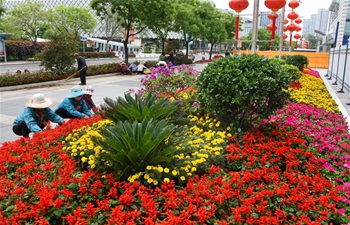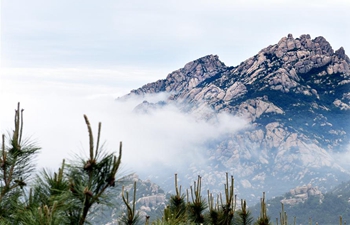SHENYANG, May 28 (Xinhua) -- Fellow villagers called Chen Xijin a "mad man" and "unreasonable" when he cut down all his chestnut trees in 2006.
"How can we make a living without the chestnuts?" said Tang Xiufen, Chen's wife, who couldn't understand why her husband replaced nearly 4.5 hectares of chestnut trees with pine saplings. She argued with him.
After 12 years, Chen's little pines have grown into a thriving forest. His family earned more than 60,000 yuan (9,400 U.S. dollars) last year by selling pine nuts.
Chen's village is tucked away in the mountains of northeast China's Liaoning province. With little arable land for grain, chestnuts were a major source of income for more than 40 years.
When Chen was elected village head in 2004, he found chestnuts were destroying his hometown.
"Usually, we need to eradicate vegetation before harvesting chestnuts, which causes severe soil loss when it rains. The village would ultimately become surrounded by bare mountains with just rocks and sand. I would never allow that to happen," said Chen.
Chen spent some time trying to find a solution. The virgin pine woods in the mountain inspired him. He knew that pines could conserve soil and water, and their nuts were popular in markets.
However, it takes nearly 20 years for wild pines to produce nuts. The poor villagers seemed reluctant to wait.
So Chen and his colleagues asked a local forestry institute for help. Experts told Chen that newly developed grafted pines could halve the time before producing nuts. Chen grafted 30 scions onto wild pine saplings.
"I knew it was risky to replace chestnuts with pines, but I had no choice," Chen said. "There was no such thing as environmental protection in the past. But soil loss had been a severe problem for all of us in the village. Nobody can live on rocks."
Chen was confident that pines could save his village. He decided to set an example to his fellow villagers by cutting down his own chestnuts.
However, the villagers still hesitated after seeing Chen's grafted pines survive. After all, chestnuts had supported their families for decades.
Chen understood them and suggested they plant pines under their chestnut trees.
"We wouldn't cut the chestnuts until the pines grew big enough to bear fruit so that villagers could have stable income and the environment could recover gradually," Chen said.
Soon, 530 hectares of pines were planted alongside the chestnut trees. Twelve years later, the cultivation area of pines has almost doubled. In the meantime, the area of chestnut trees has shrunk to a little over 100 hectares, down from nearly 900 hectares at the peak.
For villagers, pines have already become an even more valuable source of income than chestnuts. But for Chen, they are a testament to villagers' rising environmental awareness.
"We are children of the mountains. We take everything we have from them, so we must protect them better. Clean water and lush mountains are invaluable assets to us," Chen said.

















